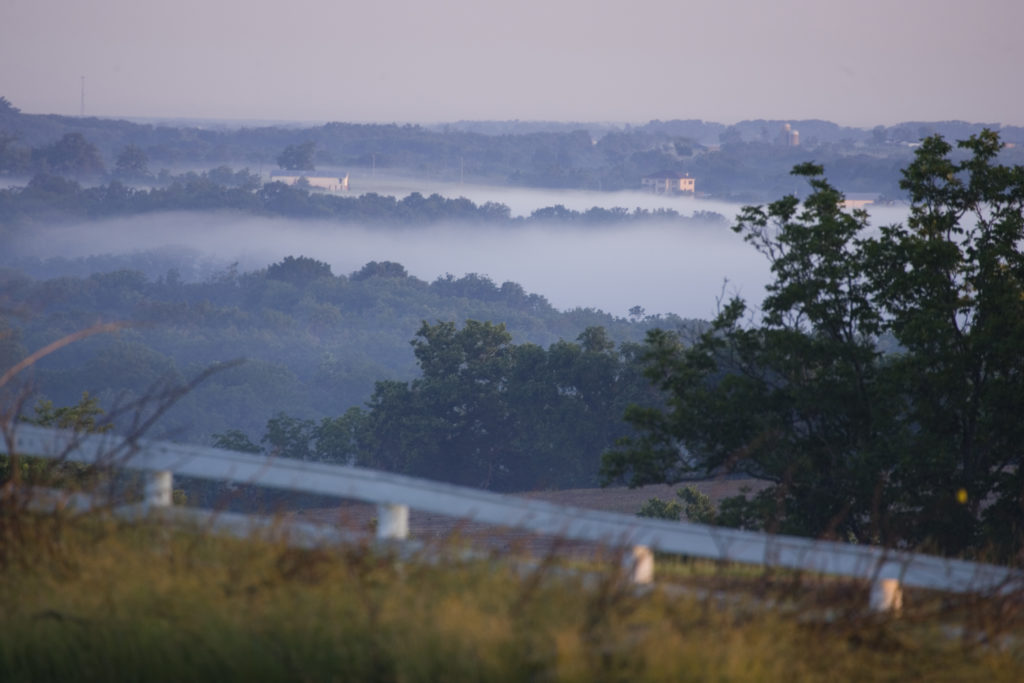Aaron Genton, Collections Manager
I’m sharing this visitor’s account because I really like the description of the natural landscape given by the author. While his main purpose is to describe the Shakers, he feels compelled to situate the people in the context of the land in which they live, and he does so in one of the most articulate ways that I’ve ever read (there are some great soundbites here). More and more I’ve noticed that when visitors attempted to describe Pleasant Hill, their descriptions almost always fall into three main categories: land, buildings, people. Of course, you could subdivide those a bit more, but these are often the main ways in which Pleasant Hill is represented in these accounts. Interestingly, we still do much of the same thing today.
One thing I like about this description is how he sees the Shakers in a complementary relationship with the natural landscape, as if they are influencing each other, almost in a symbiotic way. Now, in some cases, his assessments aren’t entirely accurate (ie: the Shakers being in perfect harmony among themselves), and he may just be doing this for artistic and dramatic effect, but, his overall vision and perspective is very interesting. I hope you enjoy it.

If there is any place in this country which has been appropriately named it is the locality from which I write. In a region famous, and justly so for its natural beauty, where hill and dale, woodland and lowland, mountain torrent and placid river are all to be found in one beautiful, diversified and picturesque scene, it is yet sufficiently striking in its attractiveness to warrant extra attention and justify the encomiums it draws from all who visit it. Here nature seems to have poured out her treasures in the way of attractive scenery, pure air and a temperate atmosphere with a lavish hand. And here, too, what change the hand of man has wrought has aided – not, as is generally the case, undone – the beautifying handiwork of nature. But it is not so much of Pleasant Hill and its beauties, though they be ever so deserving of description, that I am about to write, but of the people who have made it their abiding place, and who, from certain peculiarities in their mode of life, are objects of interest to all who pay any attention to that most interesting of all studies – human nature.
Here, in this spot so favored by nature, and possessing the double advantage of being not far distant from the busy haunts of men, and yet in a semi-solitude, a community of that peculiar religious denomination known as Shakers has been located for the past seventy years, and have thriven and grown in numbers and prosperity. Chance, and a curiosity to ascertain for myself something of their peculiar manner of living, having impelled me to pay them a visit, I have been rusticating here for a couple of days, and have found the visit both pleasant and profitable.
[The community] is located on what is known as Pleasant Hill, which here spreads out in a beautiful plateau as far as the eye can reach, and lies about a mile and a half distant from the Kentucky River, whose rapid current washes the northern base of the hill, which rises in a bold-faced perpendicular cliff, fully five hundred feet above its surface. A deep, wooded ravine, known as Cedar Run, divides Pleasant Hill from the mountains on the east, and up its western side a well-constructed turnpike road winds in a gentle ascent to the summit, where the village lies, secluded and quiet as if elevated above and shut out from the rest of the world as
“A spot that is sacred to thought and God.”
An air of quietness and peace broods over the scene, and steals with a softening, hallowing influence to the heart of the beholder, until he feels, with the poet,
“If peace can be found in this world of ours,
A heart that is humble might hope for it here.”
And the longer one stays in this vicinity the stronger this feeling takes hold on his mind. Here every thing is at peace. A community of interests and property causes strife and bickering to be unknown. Like a family united in heart, interests and religion, and all the members of which live in harmony, there is no discordant jarring or clashing to disturb the peace of the community; and the charm of a strict regularity hovers over all and enhances the pleasure one feels in contemplating the mode of life of this peculiar people. Here is the same daily routine of life. Here at the same hour each morning the same bell which rang out the morning before wakes the brethren from their calm slumbers, calling them to their morning meal and the not-too-severe labors of the day. Each division of the day is marked by its pleasing sound, and in the evening it summons the community to join in praise of their Creator, and gives the signal for retiring. All is order and regularity, and industry, frugality and temperance are virtues practiced by all.
(1879.03.14, Shakers and Shakerism, The Cincinnati Enquirer)